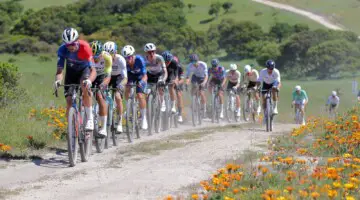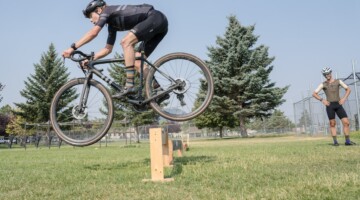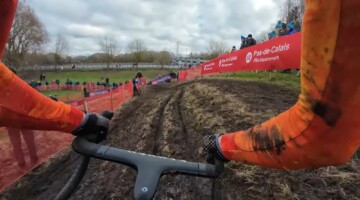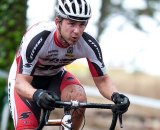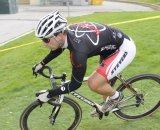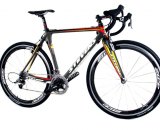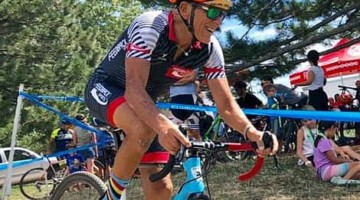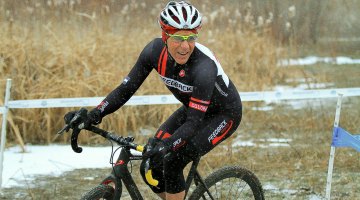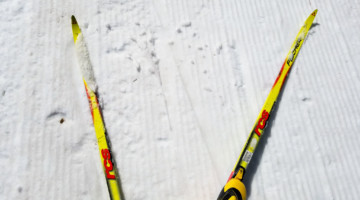by Lee Waldman
There are times, usually after a particularly hard day with middle-schoolers, when I wonder if I’ve made the correct career choice. I start to think, “what else could I do with my life?” And, if I let myself go long enough, I get to the point where I ask myself, “what would it be like to work in the cycling industry?” No talking back, no attitudes, no missing homework. Sounds pretty good!
After all, cycling is something that I’ve given over half of my life to. Wouldn’t it be cool, I think to myself, to work for a bike company, to be able to ride the latest and greatest stuff, to travel to the big races; to rub shoulders with those riders whose names appear in this magazine on a regular basis. Wouldn’t it be cool to be known as the guy who represents, (you fill in the blank here with your favorite) company.
So naturally, when I began working with Rob Brandt, the brand manager for Stevens Bikes, I had lots of questions. Rob graciously took time away from a busy work life to provide me with answers. Some of the things he said surprised me, some confirmed my long-held opinions. I found Rob to be bright, insightful, and open. He told me about himself; how he came to cycling; about ’cross bikes; about ’cross in general – its present state and it’s future; even a bit about Stevens, the company he represents.
It is difficult to interview someone closely aligned with a product without asking about said product somewhere in the conversation. Do I ride a Stevens? Yes, and that certainly got me a foot in the door with Rob, but for the purposes of this column that’s where the relationship stops. I think you’ll enjoy learning a bit more about Rob Brandt as an athlete and as a person. After all, that’s what we aim to do here at Cyclocross Magazine: give you an in-depth look not just at the racers, but at people in all aspects of the sport.
Like a lot of us, Rob has a tremendous competitive drive which serves him well in his racing and in his work.
Lee Waldman: Tell me a little about yourself, specifically your background in cycling.
Rob Brandt: Well, my current cycling background is pretty short, I guess it all started with Track and Field. I am a two time All American and after some time away from the track and a couple of injuries sidelining me from running, I needed that competitive outlet. Cycling found me, I entered my first race in Reno, NV. I won and the rest is history. I have really enjoyed racing the road and cyclocross in NorCal, there is so much talent out here that it can be really intimidating.
LW: Interesting. I’m curious. What’s different and what’s similar between competing as a runner and a cyclist? Do you think your running background helped you make the transition, especially into cyclocross?
RB: The differences are small in both training and racing, however I used to train two or more hours a day to run ten seconds…. Now I train a little more to race an hour to three hours. One of the similarities that I love is that everyone is doing it for the love of the sport, much like track we aren’t making a lot of money racing it is a great hobby that keeps us fit!
So, now I knew a bit about Rob’s background in sport. But still, I was curious as to how he ended up working in the industry.
LW: What brought you to Stevens?
RB: I had a friend (who happens to be the GM at Sinclair), who knew I was interested in expanding my horizons and wanting to get started in the bike industry. I started at the bottom sweeping floors and pulling parts, I think they got tired of me asking questions. An opening came up to work with Stevens and I was fortunate enough to get it.
I was beginning to get the picture, but still didn’t fully understand why someone would switch from a sport that was such a big part of his life.
LW: Why bikes and not running since that was your background? Was it because you wanted to distance yourself from a sport you couldn’t compete in any longer?
RB: While at some track meets, I would see some guys who wouldn’t give up the dream, and I promised myself that if I had no chance at the Olympics that I would hang up the cleats. I did just that, and I had a couple of broken bones so running was out of the question. Biking or swimming were my options, and biking was a lot more like track so it was a great fit! Yes watching track meets is still very hard, especially the Olympics, but it is great to see some old friends still tearing it up out there!
Since I started this column pondering a career switch, I wanted to know a bit about the pluses and the minuses.
LW: You mentioned to me in our conversation that you are the “new kid on the block” right now. What have you found to be the most challenging thing about breaking in to the industry in your current role? What’s been the most rewarding part?
RB: I deal with independent bike dealers, and it is a tight-knit group of people. They will give you a chance if they trust you, so gaining trust is my mission! The most rewarding part is seeing guys that I race with/against on Stevens!
LW: So, how do you gain that trust?
RB: Trust is earned not given, so it will take time and a lot of hard work.
Can’t argue with that now can we? I practice the same philosophy as a teacher.
LW: What do you see as being your strengths in your role? Your weak points? Things you’d like to get better at?
RB: I am really good with people, I am outgoing and willing to talk to anyone about almost anything! I have to work really hard to stay organized, I have a lot of irons in the fire, and I don’t like to break promises. I would like to be better at cyclocross … it’s the hardest kind of racing that I have come across, it is hard mentally and physically! Every profession has its challenges though.
LW: In general what do you see as the most challenging part of the bike industry right now? How are you meeting that challenge?
RB: Well everyone knows the current economy is not the best, and the bike industry has been hit as well. The disposable income that people use to purchase/upgrade/or add to the arsenal of bikes is not there like it once was. I know a lot of people that are racing 3-5 year old bikes, and they want to upgrade but they just don’t have the budget for it.
I am very flexible with bikes, I will make the build as custom as the customer wants it. That way they can save money but get on a new ride.
All right. So I knew a bit more about Rob as a professional. I wanted to go back and learn more about him as an athlete, specifically a cyclocross rider. I’m always curious about how other riders learn and grow in the sport.
LW: I think that’s the attraction of cyclocross for most of us, the dual challenge. Who and what has helped you learn the skills you need to be a good ’crosser?
RB: I have had a couple of cyclocross racers take me under their wing, and teach me everything they could. Monte Boyle was the first to take me out and introduce me to cyclocross, we have our own little course setup and we would ride at lunch and practice mounts/dismounts, and riding dirt! My coach Joe Martynaitis helped a lot with training and fine details. We also have a great group of guys locally that ride and train during the week and they are fun to ride with!
LW: Do you have any mentors? Any role models in cycling and in cross?
RB: I have a lot of role models in cycling and ’cross! Anyone who is a good steward to the sport is someone who I admire. I love the sprint of Cav, the hard nose attitude of Jens Voigt, and the true grit of Tim Johnson.
LW: I’ve always thought it would be tough to combine my passions with my job. What do you think? Is it hard to work in an industry and then turn around and participate in it as a competitor? How does it impact your training and racing?
RB: Working in the industry and racing go hand-in-hand, you have to be able to talk intelligently about the products and know what the customers are looking for. It is easier to watch the trends if you are around the scene all the time and listen to what is on the mind of other riders. During cyclocross season it may be tires and tire pressure one week and the next bike handling and so on.
I couldn’t help myself. I’m as much of an equipment geek as anyone. I wanted to know Rob’s thoughts on cross bikes and cross bike design.
LW: Let’s talk about bikes a bit. When I started racing cyclocross there were less than a handful of companies producing real cross bikes. Now there are a plethora with Stevens being one of them. Are they all the same? If I were to ask you to explain the difference between a Stevens cross bike and the others, what would be the difference and how would it be better?
RB: Not all cyclocross bikes are the same! There are many of the same characteristics among the high-end brands. The differences come down to geometry, carbon layup and proprietary enhancements. Stevens’ Carbon Team fits and handles like a road bike in the rough terrain, rails corners, and the front brake mount minimizes braking chatter. Bottom bracket placement is also another difference within the geometry, the carbon team has a lower bottom bracket that helps with the performance of the bike.
And – I wondered how a bike that was under some pretty incredible riders has flown beneath the radar here.
LW: This may be the same question but – Stevens is well known in Europe. Why do you think it’s not more popular at least at this point in the US? What are your plans as brand manager to do something about that?
RB: Stevens puts a lot of resources towards the BKCP PowerPlus team and support athletes such as Niels Albert and Marianne Vos. They are very popular in Europe, but they are not household names to every American. Stevens has great momentum within the cyclocross world, and we are riding the wave of excitement, as more people watch and study cyclocross Stevens will continue to top the podium.
Our plan to grow Stevens is through our grassroots campaign. We don’t have the large marketing budget that other companies do, so I like to meet with racers and enthusiasts to talk about the brand. I also hope to get some of the strong US riders on Stevens, so stay tuned for that!
LW: As far as the current crop of cross bikes in the Stevens catalogue, what’s staying the same and what’s new and exciting for the coming season?
RB: The core frame design is staying the same, some new colors are coming for this season. However, later this year there will be very big things coming from Stevens, so stay tuned!
LW: Since we are a ’cross magazine, what do you see as the challenges facing our particular corner of the sport both domestically and internationally?
RB: Cyclocross is growing the fastest out of all cycling disciplines, and we are facing some growing pains with that.
LW: What are the growing pains?
RB: Cyclocross is more of a fun loving racing scene (as compared to road racing). It will be hard to grow the sport and not lose that feel/atmosphere. Part of that scene is that you can race whatever category you want without too much hassle, I think it should be a little more regulated based on your USAC category. Another hurdle to get over is getting more cyclocross races (both domestic and abroad) televised to the masses. The web is a great tool, but I think the sport would see some more growth with a couple of the races being televised.
LW: What are your thoughts on the future of cyclocross? What changes do you see on the horizon both good and bad.
RB: Cyclocross is exploding world wide.
LW: Do you think it’s growing too fast? What do you think is making it so popular?
RB: Cyclocross is not growing too fast, but we don’t want to lose the core values. I think the popularity comes from being able to play in the mud and have fun during the off season for roadies. I also think access is a big part of the expansion, the cyclocross race can be held anywhere in the country without disrupting the general public too much. Whether you are racing in a park in New York city or a remote course in Missoula, Montana, it is all fun!
LW: Your thoughts on Nats. in Madison?
RB: Being from North Dakota… I know it will be cold! I loved Nats in Bend, the whole scene was amazing and it will be tough to beat, but I hope Madison can pull it off.
LW: Anything else that you’d like to say?
RB: I would like to thank Cyclocross Magazine for keeping it real! I love the online and magazine!
So, there it is. Rob Brandt, brand manager for Stevens Bikes. An athlete, a new kid on the block in the industry, a thoughtful professional in every sense of the word.
Enough reading for one day. Go ride!

